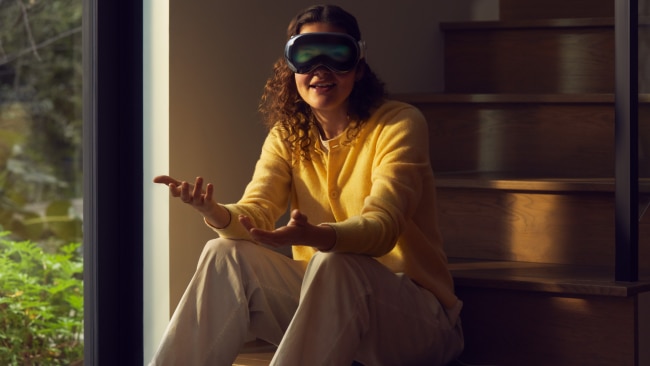Gretchen Rubin's simple hack to live a happier life
Tune in to your five senses

Mindfulness
Don't miss out on the headlines from Mindfulness. Followed categories will be added to My News.
The New York Times best-selling author delves into how harnessing the power of the five senses fosters richness and a more mindful approach to life.
Who would've thought that pink eye and a quick visit to the local doctor would've prompted Gretchen Rubin, New York Times best-selling author, to uncover some profound home truths required for her new book, Life in Five Senses?
On a recent episode of Healthy-ish, she explains that her doctor casually mentioned that her near-sighted vision may lead to a detached retina and her potential loss of eyesight.
"I knew that I could have a more rich, meaningful life, even if I lost my sight or one of my other senses. But so often I feel like we don't appreciate what we have until we lose it or fear that we lose it," the author says.
And that's exactly was happened. Rubin says her "whole walk home was this transcendent almost psychedelic experience" - a stark contrast to not noticing anything on her previous walk to the doctors (even along the bountiful streets of New York).
Like what you see? Sign up to our bodyandsoul.com.au newsletter for more stories like this
This fear of losing vision prompted her to realise "that this [lack of awareness] is happening all the time [...] I've been studying happiness and human nature for a long time and always had the feeling that I was missing something."
Engaging her five senses and "getting caught up in a way that I know I wouldn't have done a few years ago" was the key for Rubin.
"It showed me that this was a way that I could engage with the world, with other people and myself. I could do it through the five senses. [...] Something that we can all do but fail to do because we get caught up in our heads, walk the streets, and think about our to-do lists. Stop and look."
"It's so easy, yet so hard, yet so powerful," she says.
"We connect to other people through our five senses. It's a wonderful way to evoke and share memories with others [...] I had so much fun with the people in my life, like using the sense of taste to evoke memories – and then using that as a way to engage with people through our shared history.
I had all these kinds of patterns in my own behaviour that I wasn't even aware of. I didn't know why I held a pen in my hand. I didn't know why I didn't wear these certain shirts. But then, when I started to reflect on the five senses of my own behaviour, my own preferences became clearer to me. I think there is something so immediate about the five senses - it kind of unlocks something for us and that's how we can make the world richer in so many ways."
Engaging our senses
Rubin says she sat down and thought up some strategies and activities to help her engage with her senses because the more you remember to do it, the more automatic it becomes. These are some of her favourites.
Sight
Even though it's our most dominant sense, Rubin states that we "often talk about missing something while our brains are looking for something else."
Inattentional blindness, she exclaims, is when someone's "looking so hard for something that you don't see something extremely obvious." Accordingly, Rubin says, it's important to look for the overlooked.
A great way to activate 'sight' is to look for hidden messages behind signs and logos. Finally, seeing the hidden arrow in the FedEx logo is an example of how Rubin practices seeing beyond.
To her "these are the things that are right in front of us, and once we see them, we can't unsee them- they're so delightful, and yet they are so easy not to see."
Hearing
We often talk about laughter and music when it comes to hearing, but one thing that many of us struggle with is the important sense of hearing.
"Listening to other people is one of the most important things we can do just to communicate," Rubin says. As for her, listening is communicated primarily through body language.
"One of the ways to show that you're half listening is that you are half turned away. If your shoulders are parallel with someone else's shoulders, it shows that you have your full attention".
Another important aspect of listening is managing difficult, highly emotive conversations, according to the author.
"I realised a pattern that I wasn't aware of [...]. If it felt like someone was talking about something painful, I would immediately start to change or move us to a safer angle on it, instead of staying with the person as they were talking about something difficult – so really make an effort to allow awkward silences to form, to just stay, or paraphrase what someone is saying."
Touch
"Another thing I realised, and this is related to the sense of touch (appropriately of course), is if I'm having a difficult conversation with my husband, I try to put my hands on his back or make sure that we're sitting together and our knees are touching. It just creates a tender, attentive atmosphere."
She concludes that it's much harder to be angry or snarky with somebody if you're physically connected with them.
"So that's another way to listen better is to use the sense of touch to build that connection that supports listening," she concludes.
Smell
“One thing I talk about in the book is that we have foreground senses and background senses.” Rubin continues to explain that "just as our two eyes give us three-dimensional vision [...] our two nostrils also smell slightly differently."
Funnily enough, "now that I appreciate smells, I don’t mind bad smells as much as I used to, I gotta feel like they sort of deepen my experience. I sort of now find them more interesting, whereas I used to find them much more distressing." However, in saying this, Gretchen states that it is important to eliminate as many bad smells as possible. For many, this may include certain cleaning supplies.
Knowing that our noise picks up different scents helped her realise "that I was putting up with a lot of negative sensory inputs that I didn’t need to."
Originally published as Gretchen Rubin's simple hack to live a happier life


